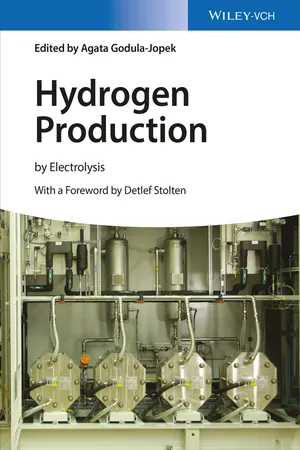
Hydrogen Production
by Electrolysis
Agata Godula-Jopek
- English
- ePUB (disponibile sull'app)
- Disponibile su iOS e Android
Hydrogen Production
by Electrolysis
Agata Godula-Jopek
Informazioni sul libro
Covering the various aspects of this fast-evolving field, this comprehensive book includes the fundamentals and a comparison of current applications, while focusing on the latest, novel achievements and future directions.
The introductory chapters explore the thermodynamic and electrochemical processes to better understand how electrolysis cells work, and how these can be combined to build large electrolysis modules. The book then goes on to discuss the electrolysis process and the characteristics, advantages, drawbacks, and challenges of the main existing electrolysis technologies. Current manufacturers and the main features of commercially available electrolyzers are extensively reviewed. The final chapters then present the possible configurations for integrating water electrolysis units with renewable energy sources in both autonomous and grid-connected systems, and comment on some relevant demonstration projects.
Written by an internationally renowned team from academia and industry, the result is an invaluable review of the field and a discussion of known limitations and future perspectives.
Domande frequenti
Informazioni
Chapter 1
Introduction
We find ourselves on the cusp of a new epoch in history, where every possibility is still an option. Hydrogen, the very stuff of the stars and our own sun, is now being seized by human ingenuity and harnessed for human ends. Charting the right course at the very beginning of the journey is essential if we are to make the great promise of a hydrogen age a viable reality for our children and a worthy legacy for the generations that will come after us.Jeremy Rifkin [1].
| Parameter | Value | Unit |
| Molecular weight | 2.016 | Mol |
| Melting point | 13.96 | K |
| Boiling point (at 1 atm) | 14.0 | K |
| Density solid at 4.2 K | 0.089 | g cm−3 |
| Density liquid at 20.4 K | 0.071 | g cm−3 |
| Gas density (at 0 °C and 1 atm) | 0.0899 | g l−1 |
| Gas thermal conductivity (at 25 °C) | 0.00044 | cal·cm s−1 cm−2 °C−1 |
| Gas viscosity (at 25 °C and 1 atm) | 0.0089 | cP |
| Gross heat of combustion (at 25 °C and 1 atm) | 265.0339 | kJ g−1 mol−1 |
| Net heat of combustion (at 25 °C and 1 atm) | 241.9292 | kJ g−1 mol−1 |
| Autoignition temperature | 858 | K |
| Flammability limit in oxygen | 4–94 | % |
| Flammability limit in air | 4–74 | % |
Indice dei contenuti
- Cover
- Related Titles
- Title Page
- Copyright
- Foreword
- Preface
- List of Contributors
- Chapter 1: Introduction
- Chapter 2: Fundamentals of Water Electrolysis
- Chapter 3: PEM Water Electrolysis
- Chapter 4: Alkaline Water Electrolysis
- Chapter 5: Unitized Regenerative Systems
- Chapter 6: High-Temperature Steam Electrolysis
- Chapter 7: Hydrogen Storage Options Including Constraints and Challenges
- Chapter 8: Hydrogen: A Storage Means for Renewable Energies
- Chapter 9: Outlook and Summary
- Index
- End User License Agreement